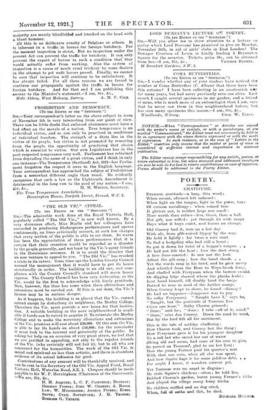PROHIBITION AND DEMOCRACY.
(To THE EDITOR OF THE " SPECTATOR.")
Sia,—Your correspondent's letter on the above subject in issue of November 5th is very interesting from our point of view. There can be little doubt that enforced abstinence must have a bad effect on the morals of a nation. True temperance is an individual virtue, and so can only be practised in conditions of individual freedom. The strength of a State lies in the virtue of its people, but virtue is not promoted by removing from the people the opportunity of practising that choice which is essential to virtue. Our own Legislature has in the past respected temperance very well. Parliament has refrained from degrading the name of a great virtue, and I think in only one instance—The Temperance (Scotland) Act, 1913—has Parlia- ment forgotten the respect it owes to the English language. Your correspondent has approached the subject of Prohibition from a somewhat different angle than usual. He evidently recognizes that such a law as the Eighteenth.Amendment is detrimental in the long run to the good of any nation.—I am,
Donnington House, Norfolk Street, Strand, W.C. 9.






































 Previous page
Previous page